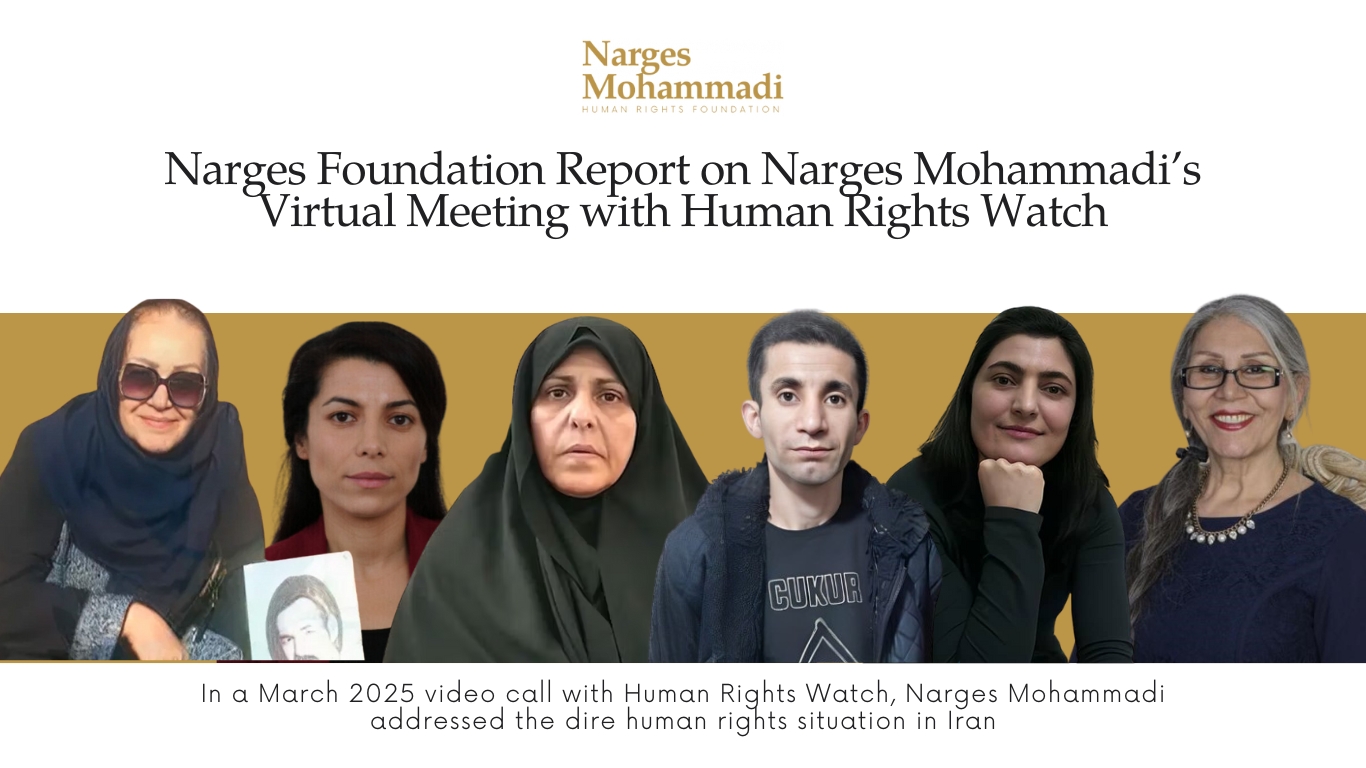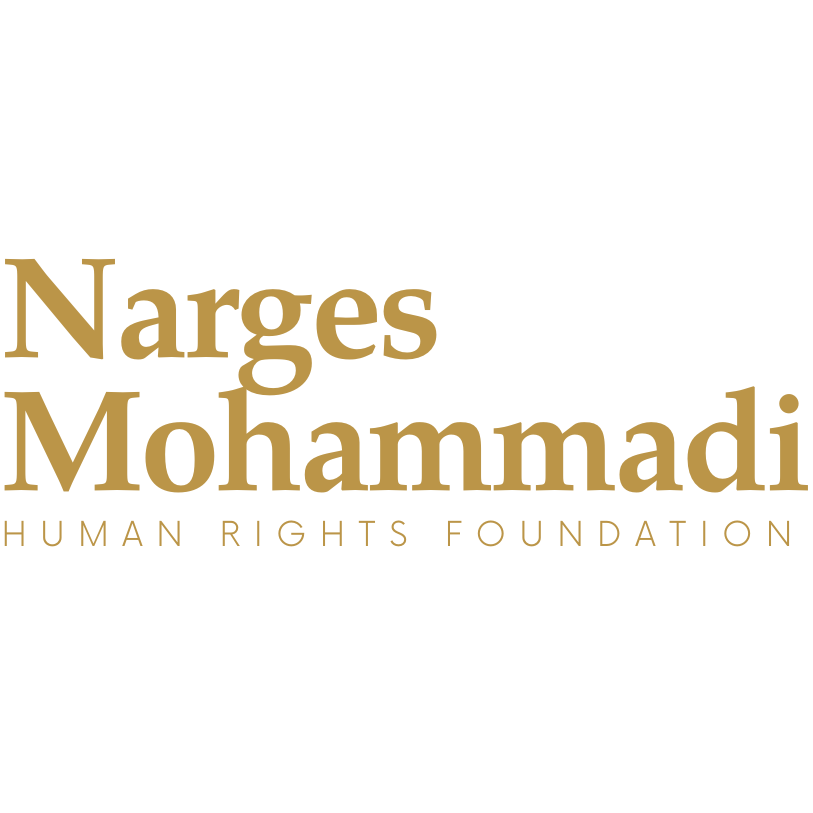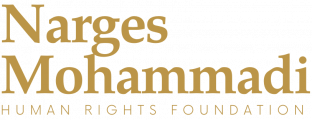
Narges Foundation Report on Narges Mohammadi’s Virtual Meeting with Human Rights Watch
Narges Foundation Report on Narges Mohammadi’s Virtual Meeting with Human Rights Watch
April 1, 2025 – Paris
In a March 2025 video call with Human Rights Watch, Narges Mohammadi addressed the dire human rights situation in Iran, the escalating repression of political and ideological prisoners, the rise in death sentences, the use of white torture, and other forms of abuse. In this one-hour discussion, she detailed the increasing crackdown on human rights defenders and women’s rights activists, citing severe and systematic violations of human rights in Iran.
Mohammadi expressed grave concern over the growing number of death sentences, particularly against women human rights activists. She specifically highlighted the imminent risk of execution for three activists: Varishe Moradi, Sharifeh Mohammadi, and Pakhshan Azizi.
She also described the systemic pressure on political and ideological prisoners, who are persistently denied access to medical care and subjected to inhumane conditions, including severe physical and psychological torture, continuous mistreatment, and prolonged solitary confinement. These measures, aimed at exerting maximum pressure, are used to extract forced confessions under torture, which are then presented as judicial evidence to justify heavy sentences, including the death penalty.
Mohammadi further emphasized the escalation of long-term solitary confinement and the use of white torture. She condemned these methods as blatant examples of torture and severe violations of international law, warning of their irreversible impact on prisoners’ physical and mental health.
During this session, speaking with Federico Borrello, Interim Executive Director of Human Rights Watch, Mohammadi stressed the necessity of international oversight regarding Iran’s widespread and systematic human rights violations. She pointed to the Iranian authorities’ lack of accountability and their intensified repression of dissent, urging immediate action from the international community. Mohammadi underscored the need to prioritize human rights in all negotiations and engagements with the Islamic Republic Regime. She called on governments and international organizations to apply effective pressure to prevent further repression and extensive human rights violations in Iran.
Following this discussion, on March 31, 2025, Human Rights Watch issued a statement addressing the situation of political prisoners in Iran and calling for the immediate release of all human rights activists arbitrarily detained by the Iranian government. The statement highlighted the longstanding policy of Iranian authorities to deprive political prisoners of medical treatment, emphasizing that this practice is used as a punitive measure to silence dissent. Human Rights Watch warned that dozens of political prisoners remain denied access to essential medical care, placing their lives at serious risk.
Some of the prisoners mentioned in the Human Rights Watch statement include:
Zeinab Jalalian – A Kurdish political prisoner sentenced to life in prison. She has been denied access to essential medical treatment for years and suffers from multiple health conditions.
Fatemeh Sepehri – A political activist and signatory of the letter calling for Ali Khamenei’s resignation, sentenced to 18 years in prison. She suffers from multiple illnesses and has been denied proper medical care.
Rahele Rahmipour – A 72-year-old civil rights activist who has been imprisoned and harassed for seeking justice for her brother and nephew, who disappeared in the 1980s. Suffering from multiple illnesses, including a brain tumor, heart disease, high blood pressure, and diabetes, she has been denied proper medical treatment, despite forensic pathologists confirming her urgent need for specialized care outside prison.
Varishe Moradi – A Kurdish political prisoner and women’s rights advocate, Moradi has been sentenced to death by the Iranian judiciary. She suffers from lumbar and cervical disc disease, yet authorities have deliberately obstructed her access to urgently needed medical care.
Matlab Ahmadian – A Kurdish political prisoner suffering from severe medical conditions and deprived of necessary treatment.
Mahvash Sabet – A former leader of Iran’s Baha’i community, who has been imprisoned for years and is in critical condition due to the denial of medical care. She is currently on medical leave but remains at risk of being returned to prison.
According to the United Nations Standard Minimum Rules for the Treatment of Prisoners, inmates requiring specialized medical treatment must be transferred to appropriate medical institutions or civilian hospitals. Human Rights Watch warned that the denial of medical care to prisoners could constitute torture and other forms of ill-treatment, which are absolutely prohibited under international law. Amnesty International has also reported that in some cases, prisoners deprived of essential medical treatment have died in custody, which constitutes arbitrary deprivation of life.
Narges Foundation
1 April 2025
Paris – France
گزارش بنیاد نرگس از جلسه مجازی نرگس محمدی با سازمان دیده بان حقوق بشر
۱۲ فروردین ۱۴۰۴ – پاریس
در نشست ویدئو کنفرانس ماه مارس ۲۰۲۵ با سازمان دیدهبان حقوق بشر، نرگس محمدی به وضعیت بحرانی حقوق بشر در ایران، سرکوب فزاینده زندانیان سیاسی و عقیدتی، افزایش احکام اعدام، اعمال شکنجه سفید و سایر اشکال شکنجه پرداخت. او در این گفتوگوی یکساعته، روند تشدید سرکوب مدافعان حقوق بشر و فعالان حقوق زنان را تشریح کرده و به نمونههایی از نقض شدید و سیستماتیک حقوق انسانی در ایران اشاره کرد.
محمدی با تاکید بر افزایش صدور احکام اعدام، بهویژه علیه زنان فعال حقوق بشر، نگرانی شدید خود را از احتمال اجرای حکم اعدام سه فعال حقوق بشر، وریشه مرادی، شریفه محمدی و پخشان عزیزی ابراز کرد. او همچنین به افزایش فشارهای سیستماتیک بر زندانیان سیاسی و عقیدتی اشاره کرد و توضیح داد که این زندانیان بهطور مستمر از حق دسترسی به خدمات درمانی محروم شده و تحت شرایط غیر انسانی، از جمله شکنجههای شدید جسمی و روانی، بدرفتاریهای مستمر، و حبسهای طولانیمدت در سلولهای انفرادی قرار میگیرند. این اقدامات که در راستای اعمال فشار حداکثری بر زندانیان صورت میگیرد، با هدف گرفتن اعترافات اجباری تحت شکنجه انجام میشود تا از این اعترافات ساختگی بهعنوان مستندات قضایی برای صدور احکام سنگین، از جمله مجازات اعدام، استفاده شود.
محمدی همچنین بر شدت یافتن حبس های طولانی مدت در سلول های انفرادی و اعمال شکنجه سفید تأکید کرد. او این روشها را مصادیق بارز شکنجه و نقض فاحش قوانین بینالمللی دانست و نسبت به پیامدهای جبرانناپذیر این رفتارها بر سلامت جسمی و روانی زندانیان هشدار داد.
نرگس محمدی در این نشست، در گفتوگو با فدریکو بوررلو، مدیر اجرایی موقت دیدهبان حقوق بشر، بر ضرورت نظارت بینالمللی بر نقض گسترده و سیستماتیک حقوق بشر در ایران تأکید کرد. او با اشاره به عدم پاسخگویی مقامات ایرانی و تشدید سرکوب مخالفان، خواستار اقدامات فوری جامعه جهانی شد. محمدی بر اهمیت قرار دادن حقوق بشر بهعنوان یک اولویت غیرقابل چشمپوشی در تمامی مذاکرات و تعاملات دیپلماتیک با حکومت ایران تأکید کرد و از دولتها و نهادهای بینالمللی خواست تا با اعمال فشارهای موثر، از تداوم سرکوب و نقض گسترده حقوق بشر در ایران جلوگیری کنند.
در ادامه این گفتگو سازمان دیدهبان حقوق بشر صبح امروز ۱۱ فروردین ۱۴۰۴، با انتشار بیانیهای به وضعیت زندانیان سیاسی در ایران پرداخت و خواستار آزادی فوری تمامی فعالان حقوق بشری که در بازداشت خودسرانه حکومت ایران به سر می برند شد. این سازمان در بیانیه خود به سیاست دیرینه مقامات ایران در محروم کردن زندانیان سیاسی از درمان پزشکی اشاره کرده و تأکید کرده است که این اقدام با هدف مجازات و خاموش کردن صدای مخالفان صورت میگیرد. دیدهبان حقوق بشر هشدار داده است که دهها زندانی سیاسی همچنان از دریافت مراقبتهای پزشکی حیاتی محروم هستند و این امر جان آنها را در معرض خطر جدی قرار داده است.
برخی از این زندانیان که در بیانیه دیده بان حقوق بشر به آنها اشاره شده است عبارتاند از:
زینب جلالیان – زندانی سیاسی کرد که به حبس ابد محکوم شده است. او سالهاست از دسترسی به درمانهای پزشکی ضروری محروم بوده و با بیماریهای مختلفی دستوپنجه نرم میکند.
فاطمه سپهری – فعال سیاسی و از امضاکنندگان نامه درخواست استعفای علی خامنهای که به ۱۸ سال زندان محکوم شده است. او به بیماریهای متعددی مبتلاست و از درمان مناسب محروم است.
راحله راحمیپور – فعال حقوق مدنی ۷۲ ساله که به دلیل پیگیری سرنوشت برادر و برادرزادهاش که در دهه ۶۰ ناپدید شدند، تحت آزار و زندان قرار گرفته و از بیماریهای متعددی از جمله تومور مغزی و تالاسمی مینور رنج میبرد. او کماکان با شرایط جسمی نامناسب در زندان اوین نگهداری میشود و از دسترسی به خدمات درمانی محروم است.
وریشه مرادی – فعال سیاسی کرد که به اعدام محکوم شده واز بیماری های مختلف از جمله دیسک شدید کمر و گردن رنج می برد، بیش از سه ماه است که طبق نظر پزشک متخصص نیاز فوری به جراحی و رسیدگی مناسب پزشکی دارد. با وجود تایید پزشکان زندان اوین در خصوص وخامت وضعیت جسمانی او و تاکید بر نیاز فوری به درمان در خارج از زندان، وی همچنان به دستور مسئولان مربوطه از اعزام به مراکز درمانی و رسیدگی پزشکی مناسب محروم مانده است.
مطلب احمدیان – زندانی سیاسی کرد که از بیماریهای جدی رنج میبرد و از دریافت درمانهای ضروری محروم است.
مهوش ثابت – نویسنده و شاعر ۷۲ ساله و از رهبران جامعه بهایی ایران است که سابقهی تحمل ۱۰ سال زندان (از ۱۳۸۶ تا ۱۳۹۶) را دارد و از تیرماه ۱۴۰۱ دومین حکم ۱۰ سالهاش را سپری میکند. اخیرا او تحت عمل «جراحی قلب باز» گرفته است، اما همچنان در خطر بازگشت به زندان است.
بر اساس قوانین حداقل استاندارد سازمان ملل برای رفتار با زندانیان، زندانیان بیمار که نیاز به درمان تخصصی دارند باید به مؤسسات تخصصی یا بیمارستانهای غیرنظامی منتقل شوند. دیدهبان حقوق بشر هشدار داده است که محرومیت زندانیان از مراقبتهای پزشکی میتواند مصداق شکنجه و سایر اشکال بدرفتاری باشد که طبق قوانین بینالمللی بهطور مطلق ممنوع است. عفو بینالملل نیز اعلام کرده است که در برخی موارد، زندانیانی که از دریافت درمان ضروری محروم شدهاند، در بازداشت جان خود را از دست دادهاند که این امر مصداق سلب خودسرانه حق حیات است.


